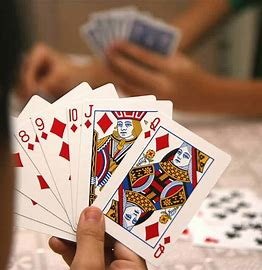Content Menu
● Introduction
● The Basics of Spades
>> Objective of the Game
>> The Deck
>> Players and Partnerships
● Setting Up the Game
>> Dealing the Cards
>> Bidding
>> Scoring Bids
● Playing the Game
>> The Play
>> Playing Spades
>> Winning Tricks
● Strategies for Success
>> Communication and Teamwork
>> Bidding Wisely
>> Managing Overtricks
>> Reading Opponents
>> Playing Defense
● Variations of Spades
>> Partnership Spades
>> Individual Spades
>> Suicide Spades
>> Blind Nil
>> No Nil Bids
● Conclusion
● Related Questions
>> 1. What is the best strategy for bidding in Spades?
>> 2. Can you play Spades with more than four players?
>> 3. What happens if a player forgets to follow suit?
>> 4. How do you score in Spades?
>> 5. What is the significance of breaking Spades?
Introduction
Spades is a classic card game that has been enjoyed by players for generations. It is typically played by four players in two partnerships, but variations exist for different numbers of players. The game combines elements of strategy, teamwork, and a bit of luck, making it a favorite among card enthusiasts. In this article, we will explore the rules, strategies, and nuances of playing Spades, ensuring you have a comprehensive understanding of how to enjoy this engaging game.

The Basics of Spades
Objective of the Game
The primary objective of Spades is to be the first team to reach a predetermined number of points, usually 500. Points are earned by successfully bidding on the number of tricks your team believes it can take during each round. A trick consists of each player playing one card, and the highest card of the leading suit wins the trick.
The Deck
Spades is played with a standard 52-card deck. The cards are ranked from highest to lowest as follows: Ace, King, Queen, Jack, 10, 9, 8, 7, 6, 5, 4, 3, 2. The suit of Spades is always the trump suit, meaning that any Spade played will beat any card from the other suits.
Players and Partnerships
The game is typically played with four players divided into two partnerships. Partners sit across from each other at the table. Communication between partners is not allowed, but players can use their bids and play styles to signal their intentions.
Setting Up the Game
Dealing the Cards
To begin, the dealer shuffles the deck and deals 13 cards to each player. After the cards are dealt, players can look at their hands and begin the bidding process.
Bidding
Bidding is a crucial part of Spades. Each player must declare how many tricks they believe they can take during the round. Players can bid any number from 0 to 13, and they can also choose to bid "Nil," which means they believe they will not take any tricks. Bidding is done in a clockwise manner, starting with the player to the dealer's left.
Scoring Bids
Once all players have made their bids, the total number of tricks bid by each team is noted. If a team meets or exceeds their bid, they earn points. If they fail to meet their bid, they lose points. The scoring system is as follows:
- Each trick taken that meets the bid earns 10 points.
- Any additional tricks taken beyond the bid (overtricks) earn 1 point each.
- If a player bids Nil and succeeds, their team earns 100 points. If they fail, their team loses 100 points.

Playing the Game
The Play
The player to the dealer's left leads the first trick by playing any card from their hand. The other players must follow suit if they can. If a player cannot follow suit, they may play any card, including a Spade. The highest card of the leading suit wins the trick unless a Spade is played, in which case the highest Spade wins.
Playing Spades
Players cannot play a Spade until a Spade has been played in a previous trick, known as "breaking Spades." Once Spades are broken, players can use them strategically to win tricks.
Winning Tricks
The player who wins a trick leads the next one. This continues until all 13 tricks have been played. At the end of the round, teams tally their tricks and calculate their scores based on their bids.
Strategies for Success
Communication and Teamwork
While direct communication is not allowed, partners can develop strategies based on their bids and play styles. Observing your partner's play can provide insights into their hand and help you make better decisions.
Bidding Wisely
Bidding is an art in Spades. Players should assess their hands carefully before making a bid. A hand with high cards in Spades and other suits may warrant a higher bid, while a hand with low cards may suggest a lower bid or a Nil bid.
Managing Overtricks
While overtricks can earn additional points, accumulating too many can lead to penalties in some variations of the game. Players should be mindful of their bids and the potential consequences of taking too many tricks.
Reading Opponents
Pay attention to the cards played by your opponents. This can give you clues about their hands and help you anticipate their moves. If you notice a player consistently playing high cards, they may be trying to win tricks aggressively.
Playing Defense
If you are in a position where your opponents are close to meeting their bid, consider playing defensively. This may involve playing lower cards to force them to use higher cards, potentially leading to a situation where they cannot meet their bid.
Variations of Spades
Spades has many variations that can change the dynamics of the game. Some popular variations include:
Partnership Spades
This is the most common version, where players form teams of two. The rules outlined above apply.
Individual Spades
In this variation, each player plays for themselves rather than in teams. The scoring and bidding remain the same, but players compete individually.
Suicide Spades
In Suicide Spades, players must bid Nil if they have a strong hand. If they fail to take any tricks, their team loses points. This variation adds an extra layer of strategy and risk.
Blind Nil
In Blind Nil, a player can bid Nil without looking at their cards. If they succeed, their team earns bonus points. However, if they fail, the penalty is higher.
No Nil Bids
Some groups choose to eliminate Nil bids altogether, focusing solely on traditional bidding. This can simplify the game and make it more accessible for new players.
Conclusion
Spades is a captivating card game that combines strategy, teamwork, and a bit of luck. Whether you are playing with friends or family, understanding the rules, bidding strategies, and gameplay dynamics will enhance your experience. As you become more familiar with the game, you can explore various strategies and variations to keep the game fresh and exciting. So gather your friends, shuffle the deck, and enjoy a game of Spades!

Related Questions
1. What is the best strategy for bidding in Spades?
The best strategy for bidding involves assessing your hand carefully. Consider the high cards you have, the potential for taking tricks, and whether you can safely bid Nil. It's essential to be realistic about your hand's strength.
2. Can you play Spades with more than four players?
Yes, Spades can be played with more than four players by forming larger teams or playing individual games. However, the traditional version is designed for four players in two partnerships.
3. What happens if a player forgets to follow suit?
If a player forgets to follow suit, they may be penalized depending on the house rules. Typically, the player must play a card from the leading suit if they have one. If they do not, they can play any card.
4. How do you score in Spades?
Scoring in Spades is based on the number of tricks taken compared to the bids made. Each trick that meets the bid earns 10 points, while overtricks earn 1 point each. Failing to meet a bid results in a penalty.
5. What is the significance of breaking Spades?
Breaking Spades refers to the first time a Spade is played in a trick. Once Spades are broken, players can use them strategically to win tricks, making it a crucial moment in the game.
































